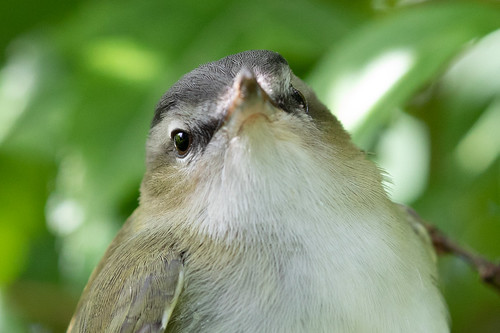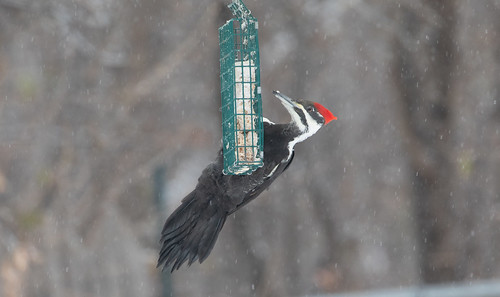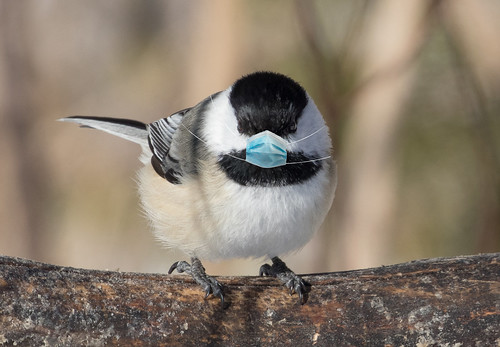As pandemic cases swell and more and more Americans die from it, I’ve been turning to birds to cope. When my family started seriously social distancing back in March, every day I could see new wonders while staying almost entirely at home. All spring and early summer I had wonderful fun taking photos and making sound recordings of the many birds in my yard each day.
Now the days are so short that I’m eating both breakfast and dinner while it’s dark outside, and those shorter days are producing very few birds. We had some lovely influxes of winter finches here—for a few weeks, Pine Siskins were wonderfully abundant in my yard, redpolls have turned up several times, and I’ve had a couple of flocks of White-winged Crossbills show up, too.
But I can no longer look out the window and expect to see birds. Every day or two, one of my neighborhood Pileated Woodpeckers turns up for a few minutes, or a female Red-bellied Woodpecker, and a small flock of juncos has turned up a couple of times in the past week, but my daily total of species hasn’t exceeded 10 species in December so far.
In early November, before the White-throated and Fox Sparrows disappeared, I was seeing 17 or 18 species most days, but both those late migrants and wandering winter finches have dried up now. I’ve been trying to teach my brain to be delighted with chickadees when they appear several times a day with their attendant nuthatches, but I can’t but feel disappointed with the paltry numbers, especially when I think about how these short days will grow even shorter and drearier before they finally start lengthening imperceptibly on the solstice. With luck and as the weather grows more wintry again, I can hope for more winter finches to show up, but that is not guaranteed.
Over my lifetime, some of the biggest blockbusters of all movies have been about disasters. I suppose people feel a kind of thrilling empowerment imagining themselves as the protagonist conquering a horrifyingly evil force against all odds. Armageddon in our imagination may seem interminable, but the movie version lasts just 151 minutes (several minutes fewer if you walk out during the credits) and you get to munch on popcorn. When you go outside, life is entirely back to normal.
Living as a real-life disaster unfolds is a little trickier. Some of the very people who envision themselves making the ultimate sacrifice that Bruce Willis character did in Armageddon refuse to wear a mask in public spaces to save the lives of actual, real-life human beings even as we’re now averaging more than 2,000 deaths from Corvid-19 every day. December 9th, we hit a gruesome death toll of 3,243 according to worldometers.info. My own Congressman is refusing to work with the incoming administration to make a smooth transition even as my district is among the worst in the nation for number of infections.
Anne Frank wrote:
The best remedy for those who are afraid, lonely or unhappy is to go outside, somewhere where they can be quiet, alone with the heavens, nature and God. Because only then does one feel that all is as it should be and that God wishes to see people happy, amidst the simple beauty of nature. As long as this exists, and it certainly always will, I know that then there will always be comfort for every sorrow, whatever the circumstances may be. And I firmly believe that nature brings solace in all troubles.
Life was horrifyingly scary in the Annex where her family was hiding out from the Nazis and where she wrote those words before she was taken prisoner and died in the Bergen-Belsen concentration camp.
At that same time, four British soldiers being held as prisoners of war in a terrible German POW camp managed to hold onto their sanity and a small sense of purpose in life by watching birds (I wrote about this in my book review of Birds in a Cage), even as so many American soldiers were fighting the Nazis and languishing in POW camps in their struggle to keep that sort of fate from befalling us.
As our soldiers fought overseas, civilian Americans were rationing, dealing with air raids, and trying to cope with the terror of receiving a telegram from the War Department—407,316 American soldiers were killed in the four years of that war.
So far, just since February, we’ve lost almost 300,000 Americans to Covid-19. American involvement in World War II lasted 4 years; we’re on track to surpass our World War II mortality numbers in just one year, well before enough people are vaccinated to give us herd immunity.
For this year’s Christmas Bird Count, I’ll be doing a simple yard list and walking around my neighborhood rather than doing my usual route. Some people have been deriding people like me as “cowards” for staying home as much as possible and masking when away from home, but when did conscientiously looking out for one another and doing what we can to protect our vulnerable family members ever constitute cowardice?
I try to remember how much my minor sacrifices right now are at least slowing the spread of this disease a bit, though it's of course not nearly enough because not nearly enough people are doing the same thing. It's certain now that I’ll be spending another spring migration hunkered down at home, watching bird numbers slowly and then rapidly rise again, listening as their calls and songs swell with the increasing day length. It’s not much when I'm so hungry for variety right now, but I try never to forget that it’s better to safely enjoy the sparkle in a chickadee’s eyes than to be on a ventilator in an isolation ward, away from my family and those beloved chickadees.
I can't help but think of the words attributed to Ben Franklin, "We must all hang together or, most assuredly, we shall all hang separately." He wasn't thinking about how very separately people are dying in isolation in Covid wards as hospitals exceed capacity, but I am. My chickadees remind me of how good, resourceful beings DO hang together, warning one another about danger even as they maintain proper social distancing. It’s not much consolation right now, but it’s something. Please stay safe and well, dear reader.





